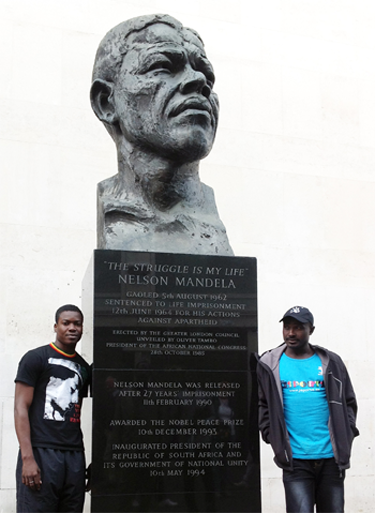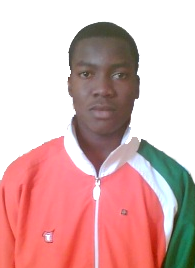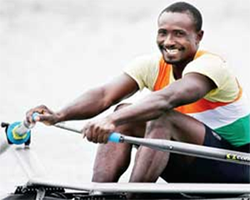Feb 05, 2026
Feb 05, 2026
 In age of international tension, when human frailty is clear for all to see, sport at least can afford some respite. Showcase sporting events such as the Olympics enable political and economic rivalries and woes to be put to one side, albeit briefly, and for us to enjoy something of mankind’s desire to excel in a constructive manner. Competition of any sort is replete with its stories of triumph and tragedy, of personal records, unexpected victories and mental re-runs of what might have been. As a species we can learn much by reflecting on the experience and emotions involved, for in so doing maybe we can an insight into our motivations in daily life, into personal success and disappointments.
In age of international tension, when human frailty is clear for all to see, sport at least can afford some respite. Showcase sporting events such as the Olympics enable political and economic rivalries and woes to be put to one side, albeit briefly, and for us to enjoy something of mankind’s desire to excel in a constructive manner. Competition of any sort is replete with its stories of triumph and tragedy, of personal records, unexpected victories and mental re-runs of what might have been. As a species we can learn much by reflecting on the experience and emotions involved, for in so doing maybe we can an insight into our motivations in daily life, into personal success and disappointments.
The London 2012 Olympics was a case of the whole being greater than the sum of its parts. For the casual observer, the spectator and armchair critic it may have appeared to be an exhilarating two week jamboree or an obscenely costly indulgence. To the athletes, trainers and the legions of those who played their part in shaping and executing the 2012 Games it was potentially a life changing experience, one that is best explained at a human level.
For the West African country of Niger it is some forty years since Issaka Daborg won a bronze in the Munich Olympics (1972) in the Men’s Light Welterweight, the country’s only Olympic medal to date. The challenges faced by aspiring athletes from this landlocked West African nation are immense (Niger ranked 186th of 187th in the United Nations Human Development Index (HDI) in 2011) The experience of Nigerien athletes is a world away from that enjoyed by their opposite numbers in the Australia, China, UK and USA, they battle multiple difficulties including lack of funding, non-existent or inadequate equipment, inadequate food, no physiological and psychological back-up and outdated or mediocre specialist coaching.
The experience of two Nigerien athletes is almost certainly typical of that of sports men and women from other developing nations.
 Abdoulaye Hima Moustapha (Age: 20; Height: 6' 0"/1.83m; Weight:152lbs/69kg), a former lycée student with aspirations of going on to university to read for a degree in the environment and mining represented his country in boxing in the men’s welterweight category. Moustapha is immensely proud of the fact that he was chosen to carry his nation’s flag at the Opening Ceremony of London 2012; “...I felt as if I had all Niger on my shoulders” he recalls with evident pride. His memories of preparing for the Olympics are equally clear; “I was sent to Rouen in France for one year and two months. At least there our diet was more focussed, I ate more fruit and vegetables, rice, potatoes, salad, grilled chicken or fish, less red meat and maybe chocolate once a week.” Whilst overseas he also had the occasional cardiovascular tests, but also sensed that; “the foreign coaches seemed far more interested in observing and poaching our techniques”. Three months prior to Olympics the boxer flew back to Niger after having been told that he had not qualified, naturally he eased up on his training, only to be suddenly told a fortnight before the start of London 2012 that he was going to box for his country after all. “Once in London I trained four times a day.”
Abdoulaye Hima Moustapha (Age: 20; Height: 6' 0"/1.83m; Weight:152lbs/69kg), a former lycée student with aspirations of going on to university to read for a degree in the environment and mining represented his country in boxing in the men’s welterweight category. Moustapha is immensely proud of the fact that he was chosen to carry his nation’s flag at the Opening Ceremony of London 2012; “...I felt as if I had all Niger on my shoulders” he recalls with evident pride. His memories of preparing for the Olympics are equally clear; “I was sent to Rouen in France for one year and two months. At least there our diet was more focussed, I ate more fruit and vegetables, rice, potatoes, salad, grilled chicken or fish, less red meat and maybe chocolate once a week.” Whilst overseas he also had the occasional cardiovascular tests, but also sensed that; “the foreign coaches seemed far more interested in observing and poaching our techniques”. Three months prior to Olympics the boxer flew back to Niger after having been told that he had not qualified, naturally he eased up on his training, only to be suddenly told a fortnight before the start of London 2012 that he was going to box for his country after all. “Once in London I trained four times a day.”
With his memories of the Olympics still fresh he laughs as he remembers clambering into the driver’s seat of a car on his arrival (he was not aware that in Britain people drive on the left) and speaks with enthusiasm about how ordinary people seemed far less indifferent than those he had encountered in France. “I wish our coaches took more interest in us, they often just told us what to do, then left us to get on with it. Our lack of preparation and technique showed in our poorer levels of stamina. With real support and professional back up I believe athletes like myself could have achieved far greater success.”
 Moustapha’s compatriot Hamadou Djibo Issaka (Age: 35; Height: 169cm/5’7”; Weight: 81kg/179lbs) experience was even more extreme. Issaka is a gardener by profession, who also sells small containers of oil to make ends meet; he found himself even less prepared than some of his team mates. As if hailing from a country without a single rowing boat was not challenge enough, incredibly he set off to London having had a mere three months of pre-Games training. Issaka’s route to London 2012 came after he was was awarded a wildcard courtesy of an IOC programme aimed at developing sports in areas where they are less familiar. His preparation period saw time spent in Egypt, Tunisia and Belgium. “It was quite a shock. I trained in the sea off Tunisia and on a river in Belgium. Then when in England I had two days training, so I wasn’t really acclimatized.”
Moustapha’s compatriot Hamadou Djibo Issaka (Age: 35; Height: 169cm/5’7”; Weight: 81kg/179lbs) experience was even more extreme. Issaka is a gardener by profession, who also sells small containers of oil to make ends meet; he found himself even less prepared than some of his team mates. As if hailing from a country without a single rowing boat was not challenge enough, incredibly he set off to London having had a mere three months of pre-Games training. Issaka’s route to London 2012 came after he was was awarded a wildcard courtesy of an IOC programme aimed at developing sports in areas where they are less familiar. His preparation period saw time spent in Egypt, Tunisia and Belgium. “It was quite a shock. I trained in the sea off Tunisia and on a river in Belgium. Then when in England I had two days training, so I wasn’t really acclimatized.”
Single skulls is exacting at the best of times, but with no special diet and no specialist training it is little wonder the Nigerien found the experience daunting. “In truth we had received totally inadequate physical preparation. Yes, I have strength, but I lacked both the technique and especially the cardio training that is vital for rowing.” Whilst evidently proud to have had the opportunity to represent his country, he was critical of the Fédération Internationale des Sociétés d'Aviron (FISA) - the International Rowing Federation and The Nigerien Olympic and National Sports Committee (Comité Olympique et Sportif National du Niger, COSNI) for not ensuring that a choice of halal food was made available at training centers such as Bloso Topsportcentrum in Belgium – the lack of culturally appropriate food there were days when he had been unable to eat whilst in Belgium.
Issaka beams with pride when discussing rowing at Eton Dorney, “It was absolutely incredible. The crowd was fantastic. They really helped me. I was determined to do my best for my country and my personal honor.” Whilst a few seasoned rowers might have questioned such a rowers presence at the 2012 Olympics, the adulation and warmth of spectators at the London Olympics helped make up for some of the inadequacies elsewhere. Issaka’s spirited performance not only earned him the admiration of the crowd, but also excited considerable media interest. Niger’s rowing ‘hero’ is adamant that he does not seek special favors; “...if countries such as Niger are going to have any chance of winning medals at Rio 2016 governments and sports authorities need to invest now. We have the ability, but lack the sporting infrastructure and proper training.” Attending international tournaments has the added challenge of the fact that competitors from developing countries are not even given any money to help with basic expenses. Governments, even cash strapped ones need to remember that the health and well-being dividends from encouraging competitive and recreational sport cannot be under-estimated.
In the end neither Moustapha nor Issaka came away from London with medals, but on the strength of the tremendous spirit that what we have witnessed this summer it is clear that athletes from the developing world deserve to be given better preparation so they are at least in with a sporting chance.
With additional thanks to Abdoul-Kader Amadou Mossi for acting as translator.
27-Aug-2012
More by : Mark T. Jones